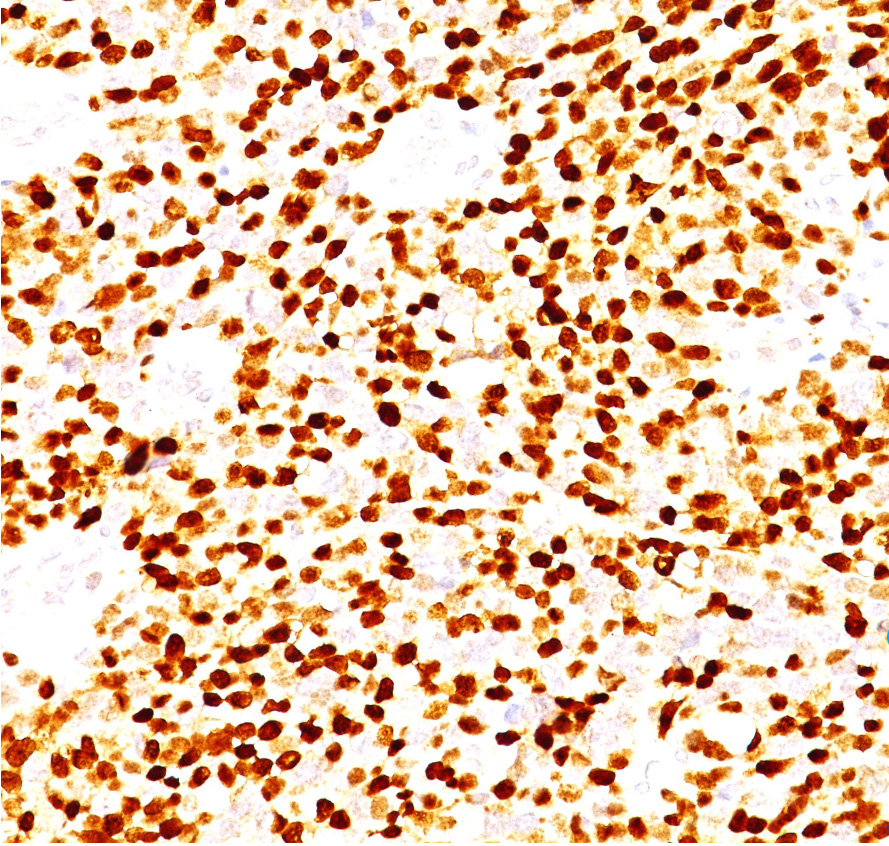Myogenin (MYOG) Mouse Monoclonal Antibody [Clone ID: MGN185]
Other products for "MYOG"
Specifications
| Product Data | |
| Clone Name | MGN185 |
| Applications | ELISA, FC, IF, IHC, IP, WB |
| Recommended Dilution | ELISA: For coating, order Ab without BSA. Flow Cytometry: 0.5-1 µg/106 cells. Immunofluorescence: 1-2 µg/ml. Western Blot: 0.5-1 µg/ml. Immunoprecipitation: 1-2 µg/500 µg protein lysate. Immunohistochemistry on Frozen Sections. Immunohistochemistry on Paraffin Sections: 0.5-1 µg/ml for 30 minutes at RT. Staining of formalin-fixed tissues requires boiling tissue sections in 10mM citrate buffer, pH 6.0, for 10-20 min followed by cooling at RT for 20 minutes. Positive Control: Rh-30 cells. Skeletal muscle or rhabdomyosarcoma. |
| Reactivities | Feline, Human, Mouse, Porcine, Rat |
| Host | Mouse |
| Isotype | IgG1 |
| Clonality | Monoclonal |
| Immunogen | Human Myogenin recombinant protein. |
| Specificity | Anti-Myogenin labels the nuclei of myoblasts in developing muscle tissue, and is expressed in tumor cell nuclei of rhabdomyosarcoma and some leiomyosarcomas. Positive nuclear staining may occur in Wilms’ tumor. |
| Formulation | 10mM PBS State: Purified State: Liquid purified IgG fraction Stabilizer: 0.05% BSA Preservative: 0.05% Sodium Azide |
| Concentration | lot specific |
| Purification | Affinity Chromatography on Protein A/G |
| Conjugation | Unconjugated |
| Storage | Store undiluted at 2-8°C. |
| Stability | Shelf life: one year from despatch. |
| Predicted Protein Size | 34 kDa |
| Gene Name | myogenin (myogenic factor 4) |
| Database Link | |
| Background | Myogenin is a member of the MyoD family of myogenic basic helix-loop-helix (bHLH) transcription factors that also includes MyoD, Myf-5, and MRF4 (also known as herculinor Myf-6). Family members are expressed exclusively in skeletal muscle and play a key role in activating myogenesis by binding to enhancer sequences of muscle-specific genes. The regulatory domain of MyoD is approximately 70 amino acids in length and includes both a basic DNA binding motif and a bHLH dimerization motif. Family members share about 80% amino acid homology in their bHLH motifs. Transfection of myogenin and other family members into a variety of non-muscle cells has been shown to either convert these cells to myogenic cells, or to transcriptionally activate a set of otherwise unexpressed muscle-specific genes. In addition to activating muscle specific genes, family members activate their own transcription and transactivate the transcription of other family members. For example, transfection of myogenin into 10T1/2 cells or Swiss 3T3 cells results in the activation of the endogenous myogenin gene as well as transactivation of MyoD. Likewise, the transfection of MyoD into these cells results in the activation of MyoD as well as the transactivation of myogenin. Each member of the family has distinct roles in muscle development; myogenin plays a key role in muscle maturation. Myogenin migrates at a molecular weight of ~34 kDa by SDS-PAGE. |
| Synonyms | MYOG, MYF4, Myogenic factor 4, BHLHC3 |
| Reference Data | |
Documents
| Product Manuals |
| FAQs |
| SDS |
{0} Product Review(s)
0 Product Review(s)
Submit review
Be the first one to submit a review
Product Citations
*Delivery time may vary from web posted schedule. Occasional delays may occur due to unforeseen
complexities in the preparation of your product. International customers may expect an additional 1-2 weeks
in shipping.






























































































































































































































































 Germany
Germany
 Japan
Japan
 United Kingdom
United Kingdom
 China
China



